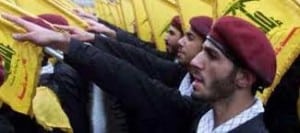By Sheera Frenkel JewishWorldReview.com |
Clinton suggests that U.S. aid and support could be at risk if Hezbollah goes too far
NORTHERN ISRAELI BORDER — (MCT) Security officials in Israel closely monitored the “day of rage” in Lebanon on Tuesday amid fears that political violence there could spill over into a new conflagration with Israel.
 As hundreds of protesters took to the streets of Lebanon to protest the naming of a Hezbollah-backed politician as prime minister, Israel beefed up security along its northern border.
As hundreds of protesters took to the streets of Lebanon to protest the naming of a Hezbollah-backed politician as prime minister, Israel beefed up security along its northern border.
Since the 2006 Second Lebanon War, tensions have remained high between Israel and Hezbollah, a militant group that operates in southern Lebanon close to the Israeli border.
Hezbollah has issued numerous statements calling for the destruction of Israel — while Israeli officials have repeatedly called Hezbollah a terrorist organization that poses a “direct threat to the Jewish State.”
The nomination of Hezbollah-backed Prime Minister Najib Mikati this week was seen as a victory for the Shiite group, while followers loyal to outgoing premier Saad Hariri, a U.S. ally, took to the streets to protest.
But those demonstrations were small and fractured, and Mikati seemed to have cobbled together enough support within the political system to assume power.
In Israel, politicians warned that the new Hezbollah government took it farther into the arms of extremist Islamic regimes, and away from its Western alliances.
Meanwhile, Secretary of State Hillary Clinton, faced with the potential shift of Lebanon’s fragile power balance away from the U.S. and toward Iran-backed Hezbollah, suggested U.S. aid and support could be at risk.
“A Hezbollah-controlled government would clearly have an impact on our bilateral relationship with Lebanon,” Clinton said in Washington. The U.S. government considers Hezbollah a terrorist organization.
Along Israel’s northern border, intelligence officials have increased their surveillance of Lebanon.
Israeli intelligence officers told McClatchy Newspapers that they have long believed that political turmoil in Lebanon over the findings of the Hariri tribunal — a U.N. investigation into the 2005 assassination of former Lebanese Prime Minister Rafik Hariri — could spill over into clashes with Israel.
During a briefing at a lookout point on Israel’s northern border, an intelligence officer gave a detailed picture of Hezbollah’s preparations for a confrontation with Israel. She acknowledged, as well, that Israel was “gearing many resources,” to prepare for a clash with Hezbollah.
“We learned our lessons from the last war, and our preparedness at this juncture is far greater,” the officer said. In keeping with the Israeli Defense Forces’ policy on intelligence briefings, the officer couldn’t be quoted by name.
“We are alert at the moment for Hezbollah to redirect their attention to us, as they have in the past, to distract from domestic problems in Lebanon,” she said.
The Hariri tribunal issued its first sealed indictments last week, and they are believed to accuse Hezbollah members of a role in Hariri’s murder. Hariri, a Sunni Muslim, was Lebanon’s most prominent politician in the years after the 1975-1990 civil war. At the time he was killed in a bombing, he was trying to limit Syria’s influence in Lebanon.
Hezbollah, which also is backed by Syria, has warned that any accusation in the Hariri murder would have grave repercussions in Lebanon. The group has called for an inquiry by the nation’s highest court into what it claims was bogus testimony given to U.N. investigators. Hezbollah also has accused Israel of being behind the assassination and a cover-up operation.
In recent months, Hezbollah has announced that it has discovered several Israeli spy installations in a mountainous area near Beirut.
The Lebanese Army said that photographic equipment as well as laser and broadcast devices were found on Mount Sannine and Mount Barouk, providing good views of Beirut and the areas surrounding it.
The Israeli Defense Forces would not comment on the allegations, or detail their intelligence-gathering methods in Lebanon. During the briefing in the north, however, the intelligence officer alleged that Hezbollah used a system of false boulders to store weapons and intelligence devices.
“We know of their system of using false stones and boulders to camouflage. These are used in the mountainous forest areas surrounding villages,” the officer said.
The intelligence officer also discussed the ways in which Hezbollah used “non-government agencies” to traffic weapons into Lebanon from Syria.
An October 2008 U.S. State Department cable published by the group WikiLeaks last month said that Iranian Red Crescent smuggled weapons under the cover of medical shipments during the 2006 war with Israel.
According to the document, a person whose name wasn’t published “had seen missiles in the planes destined for Lebanon when delivering medical supplies to the plane.” The plane was allegedly “half full” prior to the arrival of any medical supplies.
The Israeli intelligence officer said that a “great deal” was known about how Hezbollah armed itself and that the information was shared by “the Western world.” Still, she added, little was done to stop Hezbollah from rearming itself to well beyond its capacity prior to the 2006 war.
Giora Eiland, a retired Israeli Army general and a former national security adviser, has argued that the changes in Lebanon could bolster Israel’s claims that Hezbollah is preparing for a massive conflagration with Israel. “It will be much easier to explain to the international community why we must fight against the state of Lebanon,” he said.
